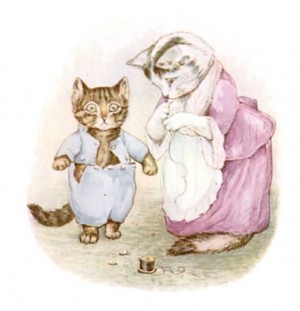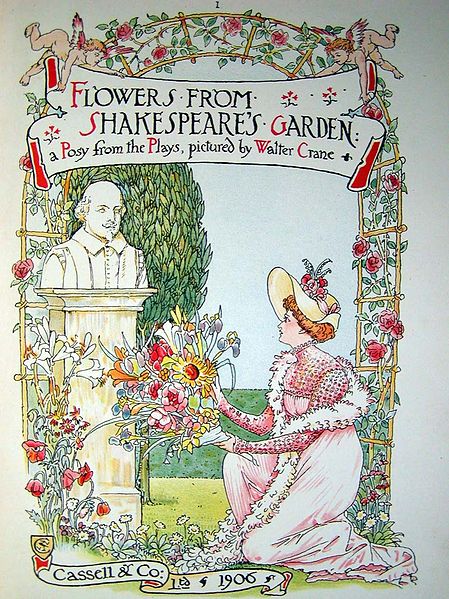
This is one of those books that always shows up on 1000 Books to Read Before You Die lists. It's been on my radar in that capacity for a long time, but at the same time, it's a series of letters between a writer and New York and a used bookstore in London. And it's not fiction. Really, 1000 Great Books?
But, I finally picked it up and read it.
Oh my God you guys... GO READ THIS BOOK.
First off, it's short. I mean, it's 112 pages long and the letters are short, so there's lots of white space. I read it in under two hours, and that was with a crazy 4-year-old running around me.
Second off, it's HILARIOUS. I mean, check out of how the letter from November 18, 1949 starts. There is no salutation, just the date and:
WHAT KIND OF A BLACK PROTESTANT BIBLE IS THIS?
Kindly inform the Church of England they have loused up the most beautiful prose ever written, whoever told them to tinker with the Vulgate Latin? They'll bur for it, you mark my workds.
It's nothing to me, I'm Jewish myself....
I enclose $4 to cover the #3.88 due you, buy yourself a cup of coffee with the $.12
Eventually through her book orders and resulting criticism, she becomes friends with everyone in the shop and starts sending regular holiday care packages with eggs and meat and other things that are still scarce due to post-war rationing.
I love the October 15, 1951 letter
WHAT KIND OF A PEPYS' DIARY TO YOU CALL THIS?
this is not pepys' diary, this is some busybody editor's miserable collection of EXCERPTS from pepys' diary may he rot.
...
PS. Fresh eggs or powdered for Xmas?
The letters keep original capitalization and punctuation. It's a great love letter to bookstores and books and a wonderful friendship and story that evolves. It's funny and heart-warming and utterly charming in a non-twee way.
GO READ IT.
Book Provided by... my local library
Links to Amazon are an affiliate link. You can help support Biblio File by purchasing any item (not just the one linked to!) through these links. Read my full disclosure statement.
Viewing: Blog Posts Tagged with: Helene Hanff, Most Recent at Top [Help]
Results 1 - 6 of 6
Blog: Biblio File (Login to Add to MyJacketFlap)
JacketFlap tags: Adult, Nonfiction, letters, correspondence, Helene Hanff, Add a tag
Blog: Here in the Bonny Glen (Login to Add to MyJacketFlap)
JacketFlap tags: Books, Beatrix Potter, booknotes, Rillabooks, Helene Hanff, what I read today, The Mouse of Amherst, Add a tag
So this morning the littles and I stayed in and read. Mice, more mice, is what Rilla wants these days. Kittens and hedgehogs are an acceptable substitute. Any small creature that wears clothing, really.
So first it was The Story of Miss Moppet—four times! I ask you. They kept begging and begging.
Then The Tale of Tom Kitten, which is crammed with delicious language. All Beatrix Potter is, but this one especially tickles me.
“While they were in difficulties, there was a pit pat, paddle pat! and the three Puddle-ducks came along the hard high road…”
and
“‘My friends will arrive in a minute, and you are not fit to be seen; I am affronted,’ said Mrs. Tabitha Twitchit.”
That petulant “I am affronted” cracks me up every time. Mrs. Tabitha is the Mrs. Bennet of B. Potter characters.
And then finally we got to the necessary mice. Well, mouse, singular. We read about half of The Mouse of Amherst (speaking of delicious language). She didn’t remember it from three years ago, which made it all the more fun. Seven is the perfect age for this loveliest of little books.
I slept too late to get any Howards End in, but did grab a few minutes for …on the Landing. Now that I’ve determined I’m going to buy a copy, I may save the rest for later and turn to one of the other interlibrary loans I have piled up, as time is ticking and they can’t always be renewed. I have The Yellow-Lighted Bookshop and a couple of Gladys Taber’s Stillmeadow books, which were recommended to me in the memoir thread the other week. I also got hold of Helene Hanff’s Elizabeth I biography for children—she admired Elizabeth so, and it seemed a fun choice for a sampling of her children’s nonfiction.
Add a CommentBlog: Here in the Bonny Glen (Login to Add to MyJacketFlap)
JacketFlap tags: Books, the reading life, Middlemarch, booknotes, George Eliot, Helene Hanff, Underfoot in Show Business, Add a tag

Early a.m.: Middlemarch chapter 12.
Particularly struck by how skillfully Eliot builds tension in the first visit to Stone Court—Featherstone ordering Fred to get a letter from Bulstrode averring he doesn’t believe Fred made promises about paying debts out of his expected inheritance. How rapidly this escalates! Featherstone has already made it clear to his sister, Mrs. Waule, that he thinks the rumor is “stuff and nonsense…a got-up story” and he defends Fred against her insinuations. “Such a fine, high-spirited fellow is like enough to have [expectations].” But then after Mrs. Waule leaves, Featherstone whips out the accusations, almost teasingly, and the order to get a letter from Bulstrode has the air of a whim, at first. And suddenly there Fred is in a terribly awkward situation that is only going to get awkwarder, and eventually quite serious. It’s a gripping conflict, it puts us squarely in Fred’s corner while leaving us under no illusions that his imprudence (those fine high spirits) has helped put him in this pickle. Featherstone is utterly believable, a difficult person who enjoys being difficult, and who enjoys having scraps of power over people. All the rest of the morning my mind kept coming back to this scene, picking over how artfully Eliot created a major conflict (in plot terms) out of a fragment of gossip.
Midday: Finished Underfoot in Show Business.
Am now bereft: it was the last (well, the first for her, but the last for me) of Helene’s memoirs. I wish she’d written five more. The tales in this one: so rich! That first summer she spends at the artist’s colony—sitting down at the desk in her quiet studio and seeing Thornton Wilder’s name written on the plaque listing all the previous occupants of this cabin. He’d stayed there in 1937; she realizes he’d written Our Town in this very spot. For a moment it throws her—I completely understood that wave of comparative despair—until she registers that in the long list of writers under Wilder, there’s no one she ever heard of. This makes her feel better, and then she’s able to work.
And the early story about how she gets to NYC in the first place—winning a fellowship for promising young playwrights. Late 30s, the second year of the award. In the first year, the two winners were given $1500 apiece and sent out to make their way in the world. In Helene’s year, the TheatreGuild decides to bring the three fellowship winners (Helene is the youngest, and the only female) to New York to attend a year-long seminar along with some other hopeful playwrights. The $1500 prize pays her expenses during this year of what sounded very similar to a modern MFA program, minus the university affiliation: classes with big-name producers, directors, and playwrights. Lee Strasberg! An unprecedented opportunity for these twelve young seminar attendees. And the fruit of this careful nurturing? Helene, chronicling the story decades later, rattles off the eventual career paths of the students: there’s a doctor, a short-story writer, a TV critic, a couple of English professors, a handful of screenwriters.
“The Theatre Guild, convinced that fledgling playwrights need training as well as money, exhausted itself training twelve of us—and not one of the twelve ever became a Broadway playwright.
“The two fellowship winners who, the previous year, had been given $1500 and sent wandering off on their own were Tennessee Williams and Arthur Miller.”
I laughed my head off when I read that.
Add a CommentBlog: Here in the Bonny Glen (Login to Add to MyJacketFlap)
JacketFlap tags: Books, 84 Charing Cross Road, Helene Hanff, Duchess of Bloomsbury Street, Letter from New York, Add a tag
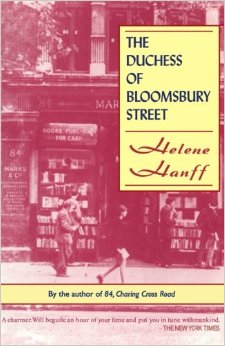 The other day, reading Mental Multivitamin, I discovered there is a sequel of sorts to 84, Charing Cross Road, which is one of my favorite books. On certain days, it is my favorite book, and certainly it is one I return to ever more frequently, as time goes on.
The other day, reading Mental Multivitamin, I discovered there is a sequel of sorts to 84, Charing Cross Road, which is one of my favorite books. On certain days, it is my favorite book, and certainly it is one I return to ever more frequently, as time goes on.
Now, why it hadn’t occurred to me—obsessive googler and binge-reader that I am—to hunt up the rest of Helene Hanff’s books, given my really almost aching love for 84, Apple of My Eye, and Letter from New York (a book that shaped New York City for me before I met it in person)—why this uncharacteristic lack of ferreting-out on my part, I cannot say. Except perhaps that sometimes a kind of obliviousness is my brain’s way of making good things last…I’m far too prone toward immediate gratification when it comes to books, especially older ones by deceased authors, books I can blithely justify snapping up for a penny + $3.99 shipping on Amazon Prime, and clutch in my greedy hands two days later.
(I have this deal with myself: used books only if the author is no longer living. My way of supporting my comrades in the trenches, and also of keeping my floors from collapsing under the weight of all the books I would spend the grocery money on if I didn’t make up rules for myself.)
Anyway, there it was at MM: The Duchess of Bloomsbury Street, a string of quotes (I love how Ms. M-mv does that), Helene Hanff’s diary account of her long-dreamed-of trip to London, two years after Frank Doel’s death. 48 hours later, it was mine, formerly the property of Salt Lake County Library System, Whitmore Library. Seems to be a first edition, published in 1973.
I love Helene Hanff. Not just her writing, but her, the person, the crackling, opinionated, piercingly observant New Yorker who toiled over Ellery Queen scripts and her own never-to-be-produced plays, and who, for twenty years, fired off missives exploding with personality to a mild-tempered, unfailingly polite bookstore employee who died before she could get to England to meet him. It’s Frank’s wife, Nora, and daughter, Sheila, who meet Helene at the airport in the beginning of Duchess. They, too, had come to know and love her over those twenty years.
I love her like an aunt; perhaps I project a little of my beloved Aunt Genia onto her, hear certain tart remarks in Genia’s voice. Their lives were nothing alike, and Aunt Genia never lived in New York, but they share an unabashedness of opinion and a vast generosity of spirit. My aunt died in 1995, Miss Hanff in 1997, and I miss them both. But Helene I get to revisit endlessly. WHAT KIND OF A PEPYS’ DIARY DO YOU CALL THIS? pops into my head at unexpected intervals, and I laugh out loud, sometimes while standing in line at the post office or pushing a cart through Target.
84, Charing Cross Road, about which I’ve written before, was her first really successful published work, and its success was a tremendous surprise to her. People wrote and called her from all over the world; when she was hospitalized shortly before her London trip, strangers sent flowers and presents. In London at last, she was continually receiving invitations from perfect strangers who’d read and loved her book, and were so happy she was visiting their city. I keep crying, living these days with her, and then she’ll say something acid and I’m howling. Oh, I love her.
Something else I didn’t know about her until this week (when my google reflex did kick in at last, and I read all her obituaries) was that she considered herself uneducated. She uses that very word in Duchess. It’s astonishing she should have felt that way. She ran out of money after a year of college, that’s why; but there can’t have been many of her generation who were better read than she; she devoured and re-devoured books, the entire canon practically (except fiction; she far preferred essays and history) and knew chunks of them by heart, and all through her books she cross-references like crazy. She was a walking Wikipedia.
Now, reading Duchess of Bloomsbury Street, I find that’s exactly how her education happened: like a long, looping chain of links.
But Oxford I have to see. There’s one suite of freshman’s rooms at Trinity College which John Donne, John Henry Newman, and Arther Quiller-Couch all lived in, in various long-gone eras. Whatever I know about writing English those three men taught me, and before I die I want to stand in their freshman’s rooms and call their names blessed.
Q (Quiller-Couch) was all by himself my college education. I went down to the public library one day when I was 17 looking for books on the art of writing, and found five books of lectures which Q had delivered to his students of writing at Cambridge.
“Just what I need!” I congratulated myself. I hurried home with the first volume and started reading got to page 3 and hit a snag:
Q was lecturing to young men educated at Eton and Harrow. He therefore assumed that his students—including me—had read Paradise Lost as a matter of course and would understand his analysis of the “Invocation to Light” in book 9. So I said, “Wait here,” and went down to the library and got Paradise Lost and took it home and started reading it and got to page 3 when I hit a snag:
Milton assumed I’d read the Christian version of Isaiah and the New Testament and had learned all about Lucifer and the War in Heaven, and since I’d been reared in Judaism I hadn’t. So I said, “Wait here,” and borrowed a Christian Bible and read about Lucifer and so forth, and then went back to Milton and read Paradise Lost, and then finally got back to Q, page 3. On page 4 or 5, I discovered that the point of the sentence at the top of the page was in Latin and the long quotation at the bottom of the page was in Greek. So I advertised in the Saturday Review for somebody to teach me Latin and Greek, and went back to Q meanwhile, and discovered he assumed I not only knew all the plays of Shakespeare, and Boswell’s Johnson, but also the Second Book of Esdras, which is not in the Old Testament and is not in the New Testament, it’s in the Apocrypha, which is a set of books nobody had ever thought to tell me existed.
So what with one thing and another and an average of three “Wait here’s” a week, it took me eleven years to get through Q’s five books of lectures.
The original rabbit-trailer. My hero. Q’s “five books of lectures” can be had for nothing, nowadays, along with probably all of the works he references. If I start now, I’ll be as educated as Helene by 2025.
(Oh heavens. That number just gave me the vapors. That’s officially the future, man.)
Helene Hanff eventually wrote a book about her autodidacticism called Q’s Legacy. Needless to say, it’ll be here by Tuesday.
Add a CommentBlog: Here in the Bonny Glen (Login to Add to MyJacketFlap)
JacketFlap tags: Helene Hanff, Shakespeare Garden, books, Central Park, Add a tag
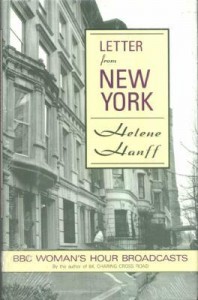 After I treated myself to 84, Charing Cross Road, it was only a matter of time before I reread Helene Hanff’s Letter from New York. This was the book in which I first encountered Miss Hanff—I don’t remember whether I bought it myself or was given it by someone, but I know I read it the year I moved to New York City, and it profoundly influenced my first experiences there. Helene Hanff taught me how to see the quirky and charming characteristics of a neighborhood; she enticed me out of my midtown office building during many a summer lunch hour and sent me scurrying all over Manhattan in search of streets and buildings she’d mentioned.
After I treated myself to 84, Charing Cross Road, it was only a matter of time before I reread Helene Hanff’s Letter from New York. This was the book in which I first encountered Miss Hanff—I don’t remember whether I bought it myself or was given it by someone, but I know I read it the year I moved to New York City, and it profoundly influenced my first experiences there. Helene Hanff taught me how to see the quirky and charming characteristics of a neighborhood; she enticed me out of my midtown office building during many a summer lunch hour and sent me scurrying all over Manhattan in search of streets and buildings she’d mentioned.
Letter from New York is a collection of radio transcripts: a monthly series of five-minute talks Miss Hanff for the BBC Women’s Hour, to share a slice of New York life with London listeners. She describes her building, her neighborhood, her favorite haunts in the city; she tells colorful and wry tales about the customs and opinions of her fellow New Yorkers. Delicious stuff.
Of all the talks, the story I remembered the most clearly was the one about the Shakespeare Garden. If you recall, I kept waiting for that part of Charing Cross Road and only realized halfway through that I’d got the wrong book.
It was in May 1979 that Miss Hanff told her BBC listeners about the corner of Central Park known as the Shakespeare Garden.
It was perched on a small hilltop and reached by high stone steps. It had flower beds blooming in spring, summer, and autumn, and a famous mulberry tree; it had a little stone moat for irrigation, with a small footbridge across it…The first park gardener I met there told me it was begun in the 1900s and was modeled on Shakespeare’s garden in Stratford. A later gardener said that the garden contained every flower mentioned in Shakespeare’s plays. He used to identify them, for ignoramuses like me. And he always pointed out the big mulberry tree grown from a cutting of a tree in Shakespeare’s own garden.
Unfortunately, as Miss Hanff explains, New York City had budget troubles and let the park gardeners go. The Shakespeare garden fell into ruin, such a depressing sight that Helene stopped walking past it; she couldn’t bear to see.
But a young couple who lived near the park couldn’t avoid it. They walked past the abandoned hilltop on their way to work on pleasant mornings. And so, on Sunday in May a couple of years ago, Peggy-the-schoolteacher and John-the-lawyer climbed the stone steps—with buckets of earth and buckets of water and garden tools—and began to dig. They worked all day; and the next Saturday they went back to the hilltop and worked all weekend.
A few neighbors and passersby saw them working and joined them. From then on, the volunteers worked weekends all spring and summer, and all the net spring and summer. And this year the garden is beginning to bloom again.
It’s not the Shakespeare Garden it once was. Peggy told me we can’t get English wildflower seeds over here. So the garden has no cowslips or harebells, and there’s no border of English roses anyore. But we still call it the Shakespeare Garden. And in a city of cliff dweller, it’s a small
Add a Comment
Blog: Here in the Bonny Glen (Login to Add to MyJacketFlap)
JacketFlap tags: Books, Guernsey Literary Society, epistolary novels, 84 Charing Cross Road, Anne of Windy Poplars, Helene Hanff, Add a tag
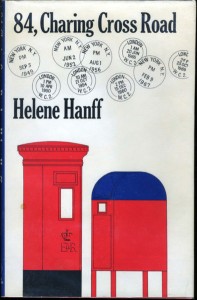 The old-fashioned kind,* with paper and stamps and fountain pens, even scratchy-nibbed ones.
The old-fashioned kind,* with paper and stamps and fountain pens, even scratchy-nibbed ones.
You can blame this list on Colleen Mondor at Chasing Ray, who recently compared John Hall’s Correspondence to 84, Charing Cross Road:
“…in that it’s an epistolary novel about books but it’s much more informative. A retired bank clerk finds a cache of letters from his great great grandfather from Dickens, Eliot, Thackeray, etc and enters into an email correspondence with Christie’s about selling them. Over the course of the months that follow he not only learns more about his ancestor but the literary greats themselves. As someone who never spent time with literature before it’s all a bit of a brave new world and he enjoys seeing what he missed. I liked all of that – a lot actually – it was only in the end that it sort of dropped off a bit. I thought there was a real friendship between the retiree and Christie’s seller he’d been emailing but it’s almost like Nash wasn’t sure how to end it. (Of course CHARING CROSS ROAD is the model for perfect endings -sad but brilliant.) Still a good read but a bit shy of wonderful.”
—Which immediately and overwhelmingly filled me with nostalgic affection for Charing Cross Road and for my first year in New York City. I don’t remember how I came across Helene Hanff’s wonderful collection of letters, but I first read it right after I moved to New York, and my early experiences there were highly colored by Hanff’s book. I remember taking it to Central Park and attempting to identify all the flowers she mentioned in the passage about the Shakespeare Garden.
After Colleen’s post, I simply had to read 84, Charing Cross Road again, but I couldn’t find my old copy. The new (used) one arrived today, and it’s a wonder I am here writing at all—the first page swept me right back in. 1949, Saturday Review of Literature, underlined typewritten titles, a request-by-mail to an overseas seller of out-of-print books: it’s impossible not to read the opening letter without a wry awareness of the difference between the way Miss Hanff seeks to obtain her yearned-for old books, and the way I rapidly and effortlessly obtained my copy of hers. Click, click, click, and two days later a man in brown places a copy on my doorstep. Marvelously convenient, but no hope of the slowly unfolding relationship between thoughtful and humorous minds like the one that develops between Miss Hanff and the London bookseller. What we have instead, today, is this—an online community of booklovers, a set of relationships that develop over time in comment boxes. And you know I relish it, am glad to live in this particular now.
But oh! just savor—
Sir:
(It feels witless to keep writing “Gentlemen” when the same solitary soul is obviously taking care of everything for me.)
Savage Landor arrived safely and promptly fell open to a Roman dialogue where two cities had just been destroyed by war and everybody was being crucified and begging passing Roman soldiers to run them through and end the agony. It’ll be a relief to turn to Aesop and Rhodope where all you have to worry about is a famine. I do love secondh
Add a Comment



